As regulatory requirements increase, especially around data security and privacy, businesses handling sensitive information must achieve SOC (System and Organization Controls) compliance. With data breaches costing organizations an average of $4.88 million in 2024, using SOC compliance software has become essential. SOC compliance software helps businesses follow rules for protecting customer data. It verifies system security, collects evidence automatically, and eliminates the need to gather documents manually during audits. The software also guides companies in meeting SOC requirements to avoid audit failures.
This guide reviews the top 10 SOC compliance software solutions, highlighting their features, benefits, and drawbacks to help you choose the right tool for your organization.
Top 10 Best SOC Compliance Software
1. Vanta
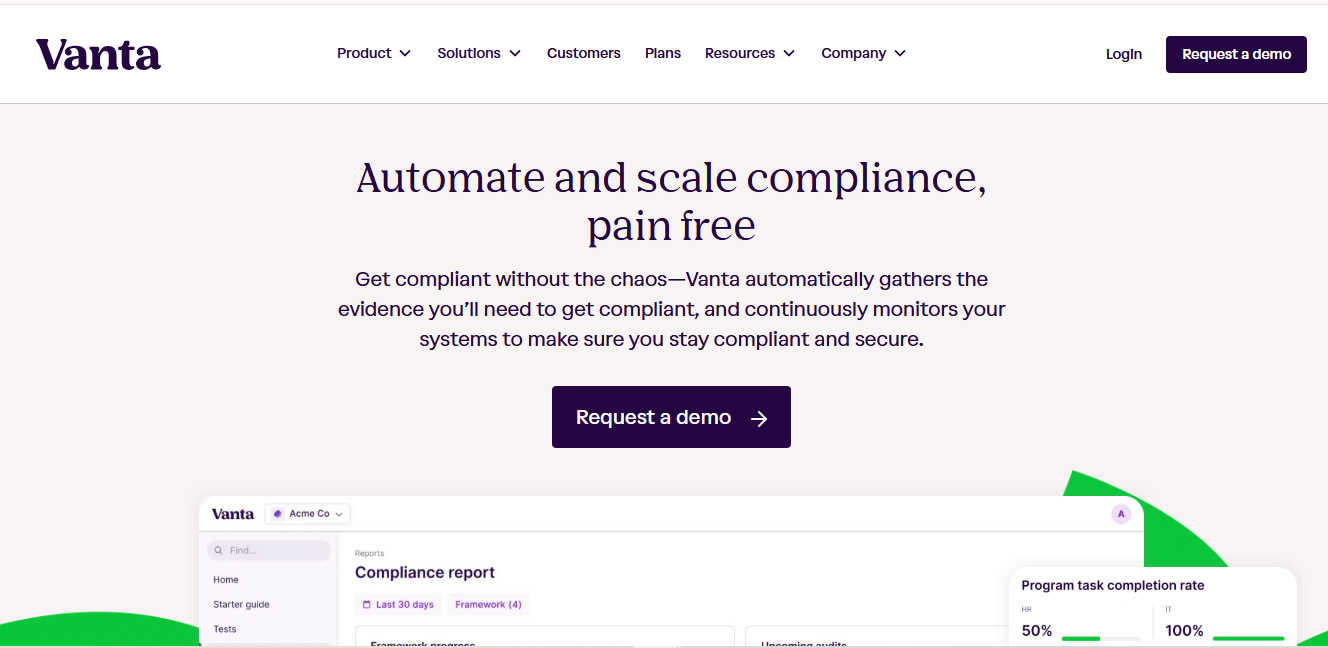
Vanta is a leading automated compliance platform that helps companies manage SOC 2, HIPAA, ISO 27001, PCI DSS, and GDPR compliance processes. It simplifies compliance by automating tasks and guiding businesses through preparation for audits across various security frameworks. Vanta also generates readiness assessments that show companies their current compliance status and suggest ways to improve. By monitoring risk continuously, businesses can prepare effectively for potential audits.
Features:
- Integrates with over 375 popular business tools
- Collects evidence automatically and monitors continuously
- Provides pre-built policy and procedure templates
- Offers compliance dashboard and reporting
- Delivers expert guidance throughout the compliance process
Pros:
- Makes the audit process easier, including auditor selection and completing audits within the platform
- Automates up to 90% of work for multiple frameworks, improving efficiency in compliance and risk management
- Supports creation of custom frameworks for specific controls and policies.
- Helps businesses share information about their security and compliance program to build trust with stakeholders
Cons:
- Pricing may be higher than some expect
- Learning all the options can take time
Pricing:
Contact sales for details.
2. Drata
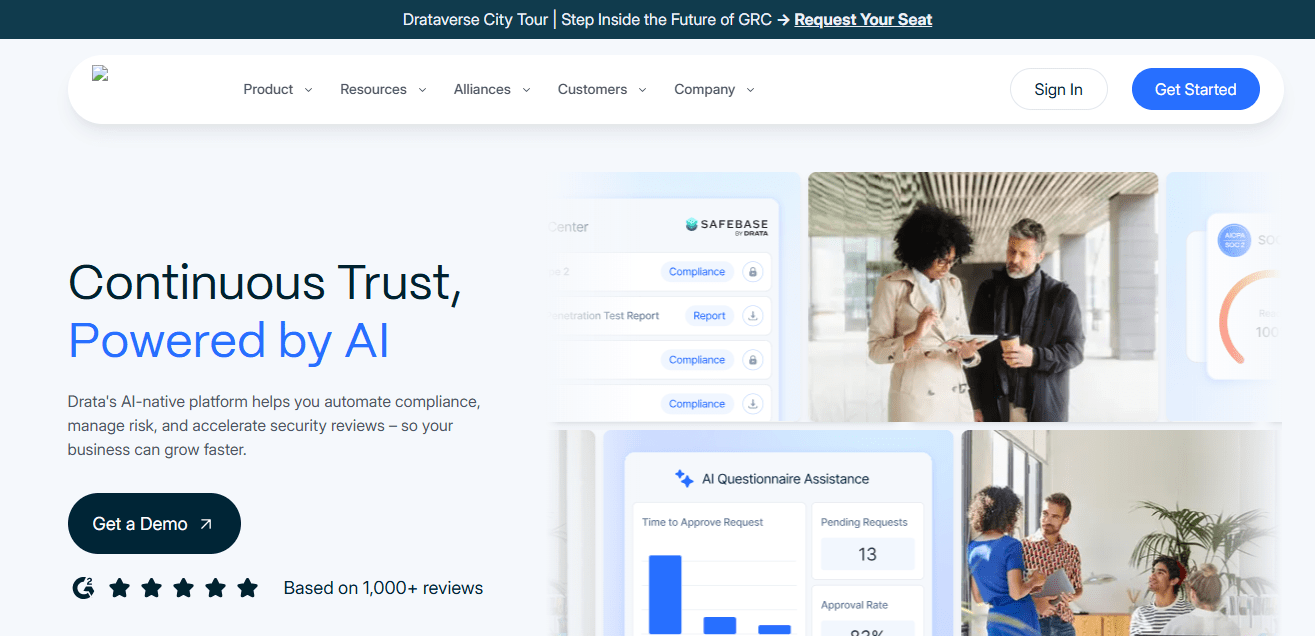
Drata compliance reporting and automation platform provides continuous monitoring, evidence collection, and audit readiness for popular compliance frameworks. It includes control libraries, automated mapping, unlimited assessment customization, and real-time readiness visibility. Drata automates many compliance tasks, reducing manual work for businesses aiming to scale their processes. It works especially well for growing companies that need advanced automation and complete framework support.
Features
- Built-in self-risk assessments
- Compliance and security reports
- Actionable insights and analytics
- Security training and employee awareness modules
- Role-based access controls
Pros
- Comprehensive compliance document library
- Employee training modules
- Advanced control monitoring tools
- Smart automation
Cons
- Evidence collection process can improve
- Feature-based pricing may be costly for small businesses
Pricing
Contact sales for details.
3. AuditBoard
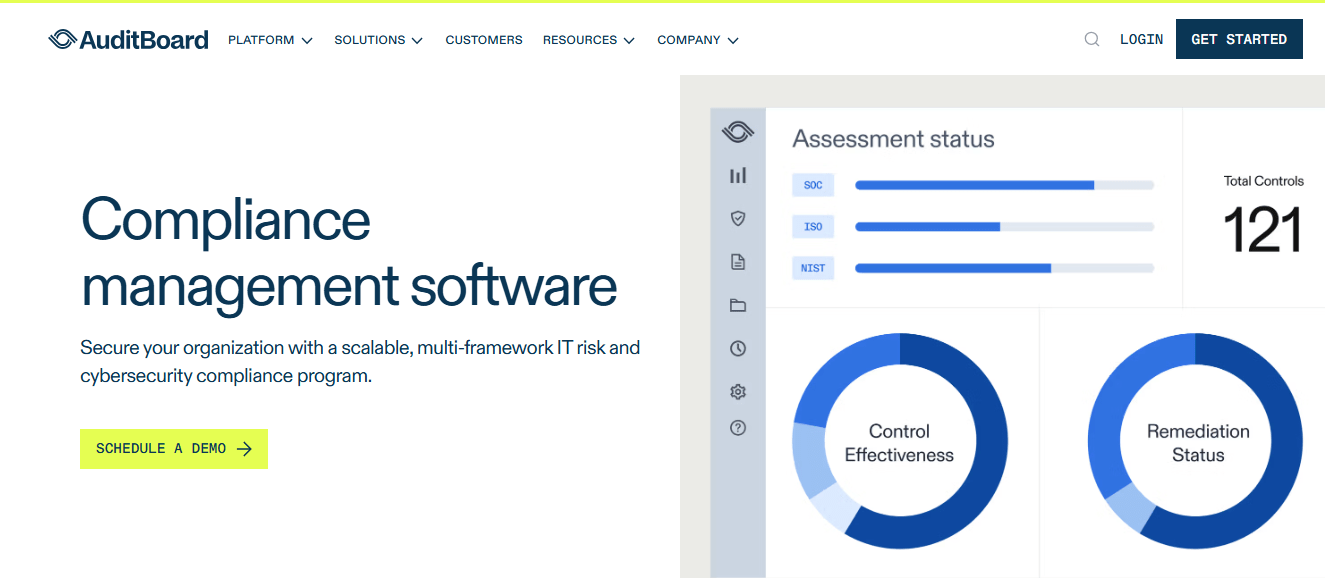
AuditBoard centralizes audit, risk, and compliance data for easier reporting and management. It increases visibility into security gaps and compliance status through interactive dashboards and detailed reports. The compliance analytics software automates the scheduling of recurring requests and assessments to support a strong compliance program. AuditBoard includes automated workflows, risk management tools, and real-time compliance tracking. Its intuitive interface allows users of all experience levels to navigate the platform with ease.
Features
- Customizable workflows to automate repetitive compliance tasks
- Audit-ready report generation
- Collaboration tools for clear communication and compliance management
- Customizable risk assessment modules
- Audit management capabilities
Pros
- Strong report management tools
- Effective project management and collaboration features
- Automated evidence collection for external audits
- Customizable security and compliance modules
Cons
- Limited risk management features
- Limited customization for highly specialized compliance requirements
Pricing: Contact AuditBoard for a quote
4. Apptega
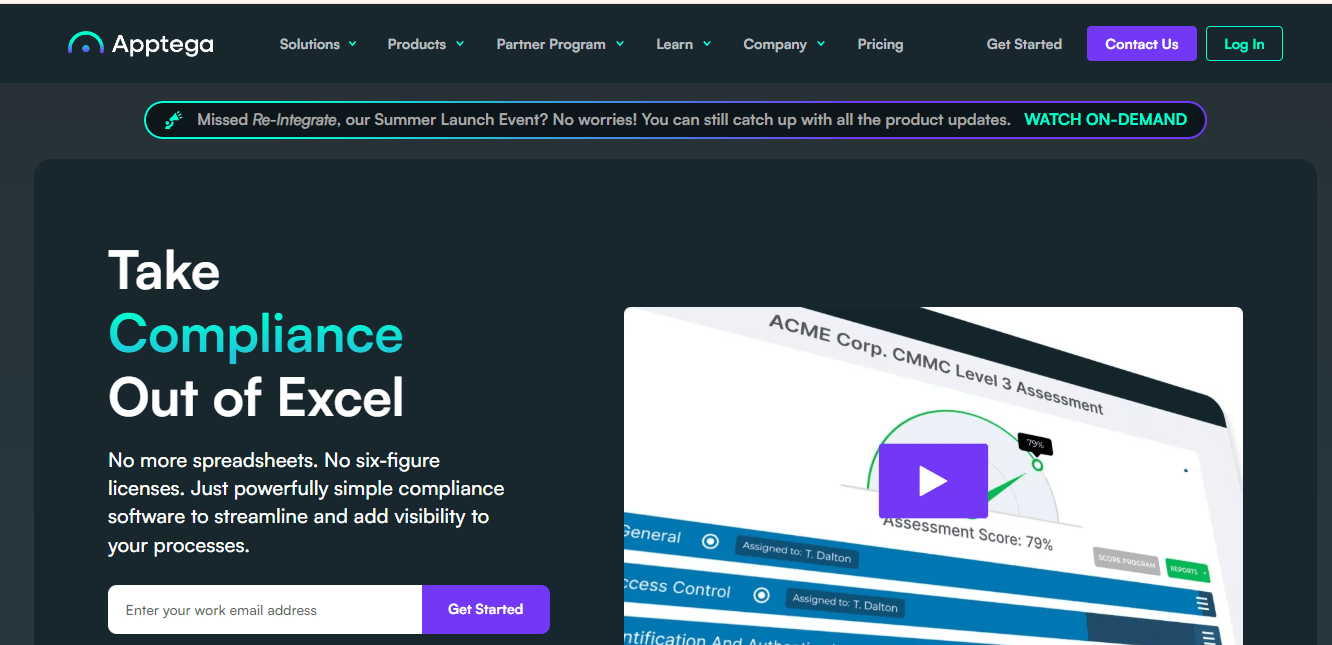
Apptega is a cloud-based cybersecurity compliance platform that helps organizations build and maintain security programs across multiple regulatory frameworks. It supports over 30 frameworks, including CMMC, ISO 27001, PCI DSS, NIST CSF, HIPAA, and SOC 2. Organizations can use Apptega to conduct assessments, manage risks, prepare for audits, and monitor vendor security postures in one centralized interface. Its framework crosswalking technology automatically maps similar controls across different frameworks, enabling users to manage multiple compliance requirements at once without repeating work.
Features
- Assessment Manager: Conducts questionnaire-based evaluations, identifies gaps, and offers AI-driven remediation recommendations at the sub-control level.
- Risk Manager: Scores, ranks, and tracks mitigation efforts for identified security risks.
- Audit Manager: Organizes evidence and validates controls to speed up audit preparation.
- Vendor Risk Manager: Evaluates the security posture of third-party vendors.
- Integration Capabilities: Connects with existing data sources and project management tools for real-time compliance visibility.
- Dashboards and Reports: Displays live compliance status and generates stakeholder reports.
- Sector-Specific Solutions: Provides compliance solutions for healthcare, financial services, higher education, and legal sectors.
Pros
- Quickly identifies security gaps and provides a roadmap for remediation.
- Helps prevent cybersecurity threats with built-in risk, vendor risk, and audit management tools.
- Offers an intuitive, all-in-one GRC platform that removes the need for spreadsheets and Word documents.
- Has a free trial.
Cons
- Some users report the user interface is not as intuitive as they would like.
Pricing
Contact for details.
5. Scrut Automation

Scrut Automation is a modern GRC platform that helps businesses of all sizes maintain continuous compliance with frameworks such as SOC 2, ISO 27001, GDPR, HIPAA, and more. It collects evidence automatically, monitors risks in real time, and connects easily with cloud, HR, and DevOps tools. Scrut enables teams to identify, assess, and mitigate risks proactively so that compliance never slows growth.
It also manages vendor risks, enforces security policies, and prepares organizations for audits, providing a centralized, always-active compliance system.
Features
- 80% automated evidence collection
- 100+ pre-built policies with customization options
- Single-window compliance management
- Continuous monitoring with real-time insights
Pros
- Strong risk assessment tools with scoring, heatmaps, and mitigation tracking
- Automated vendor risk discovery and assessment
- Integrated security training with tracking and assessments
- Customizable trust portal to showcase compliance posture
Cons
- Installation and tracking of the Scrut monitoring agent may cause compatibility issues in some setups.
Pricing
Uses a custom pricing model that depends on organization size and requirements.
6. Scytale
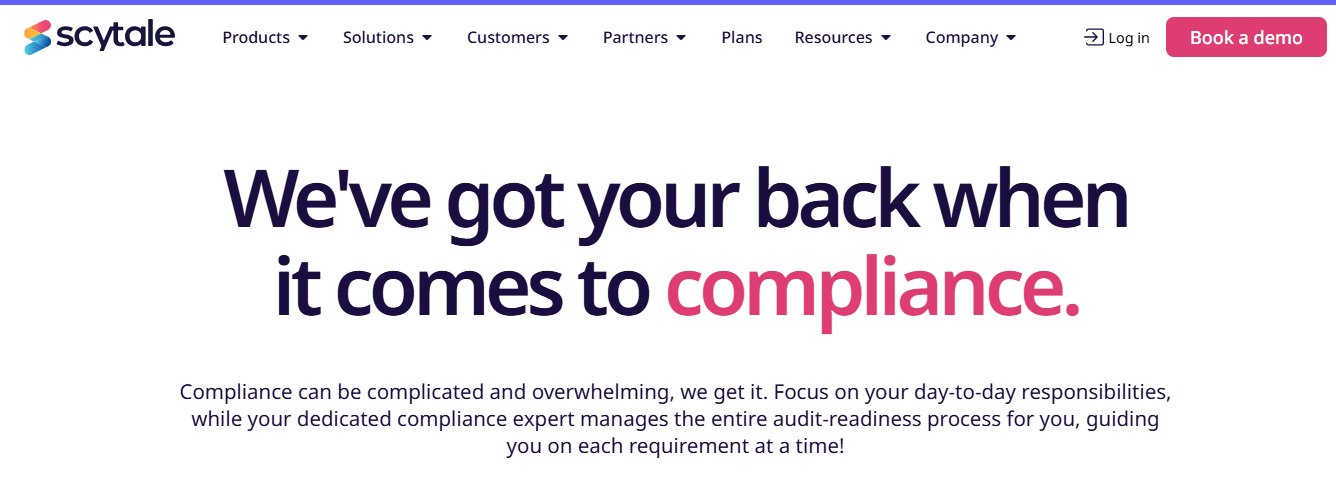
Scytale helps fast-moving tech startups save hundreds of hours by automating their SOC 2 and ISO 27001 readiness process. The platform allows teams to manage compliance workflows in one place. It simplifies compliance by making the process easy to navigate and integrates well with existing tools, making onboarding quicker. Scytale stands out for its combination of advanced compliance automation software and a dedicated team of compliance experts who guide users from start to finish.
Features
- Automates evidence collection and verifies it for key audit standards.
- Monitors control continuously with 24/7 tracking.
- Offers auditor-approved policy templates for aligning security policies and protocols.
- Supports collaboration with security auditors directly within the software.
- Provides automation to prevent security gaps during HR onboarding and offboarding.
- Includes multi-framework cross-mapping and customized policy templates.
Pros
- Saves significant time for tech startups.
- Combines automation with expert human support.
- Facilitates smooth integration with existing tools.
- Speeds up onboarding for new users.
Cons
- Limited export options.
- Navigation could be more intuitive for some users.
Pricing
Contact for details.
7. JupiterOne
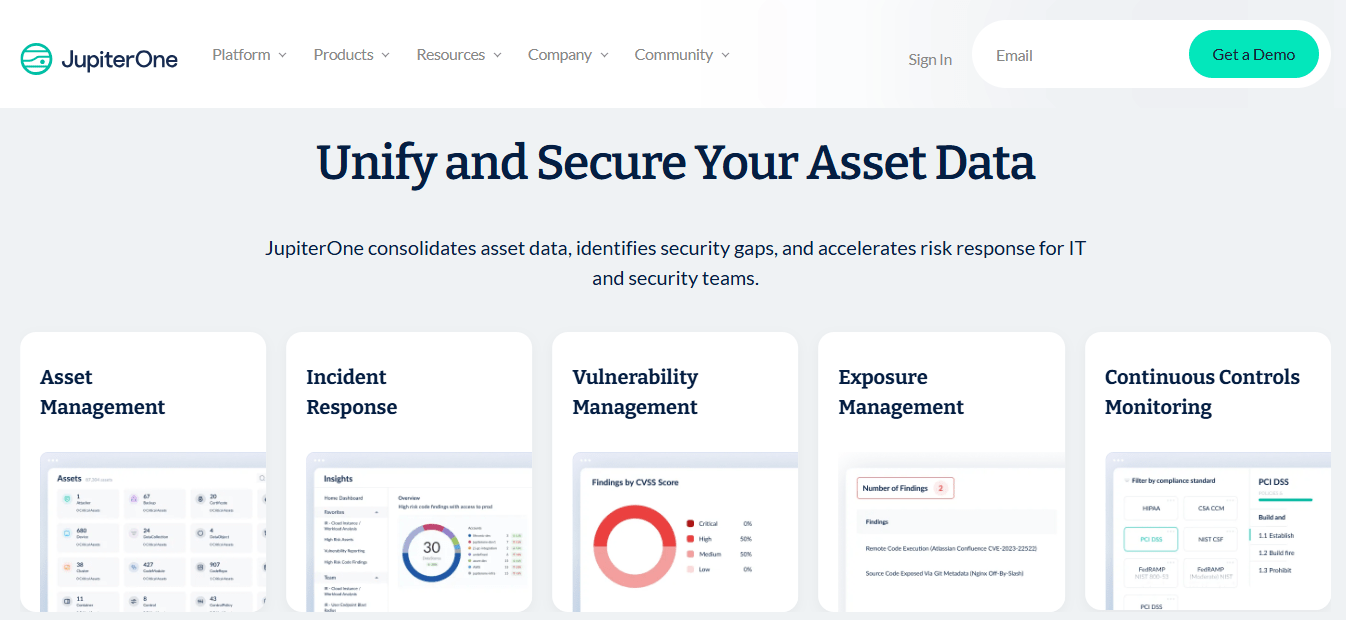
JupiterOne centralizes compliance and security management through a single dashboard that gives full visibility into your cyber assets. It supports key frameworks like SOC 2, ISO 27001, HIPAA, and PCI-DSS. The platform collects evidence automatically and monitors continuously for compliance drift, helping organizations stay proactive with security and compliance. Its query language and graph-based visualizations let you explore asset relationships, detect security gaps, and prioritize remediation. This approach simplifies compliance management while improving overall security operations.
Features
- Automatically discovers and tracks all assets from multiple data sources in one location for compliance data.
- Uses JupiterOne Query Language for faster search and analysis of compliance information.
- Displays relationships between assets through graph-based visualizations.
Pros
- Enables detailed segmentation of security data with customizable and comprehensive tagging.
- Maintains continuous compliance by mapping assets to security standards with the ability to customize those standards and mappings.
- Lets users create custom dashboards to report on security posture and set alerts for different security events.
Cons
- Users report a steep learning curve at the start.
Pricing
- Free Forever for one user.
- Starts at $1,000/month for unlimited users.
8. Thoropass
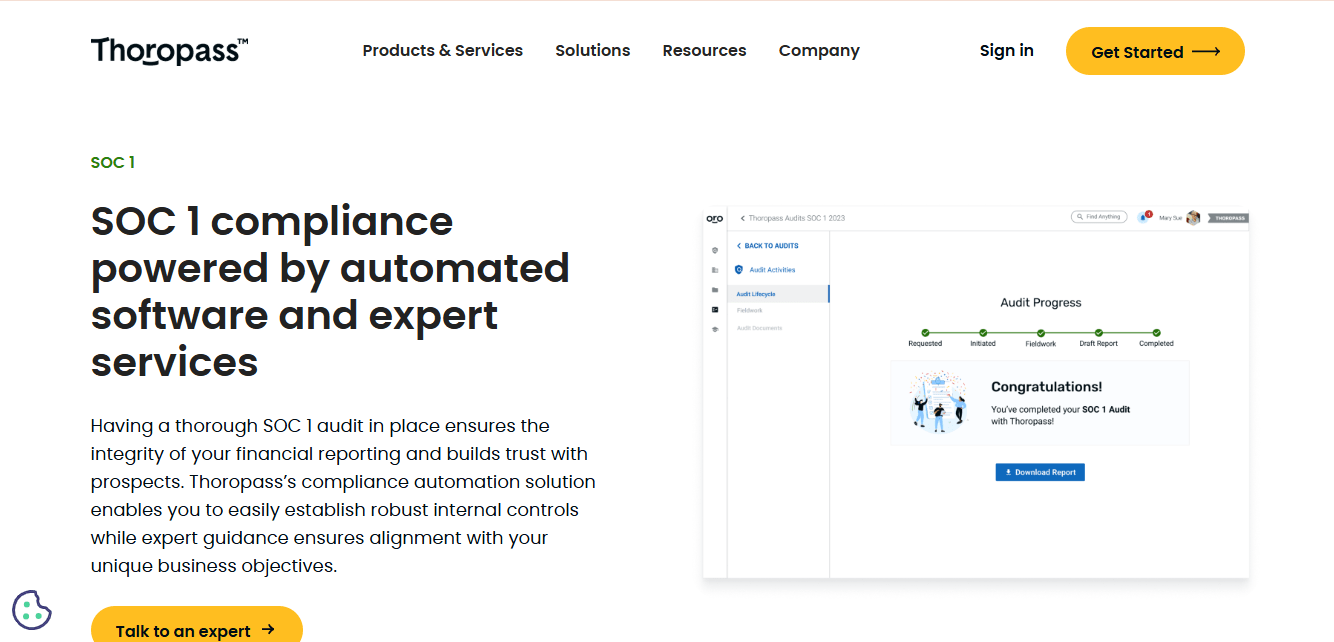
Thoropass focuses heavily on access management. It ensures that only authorized individuals can access sensitive systems and data. For example, you can track and revoke access for former employees, protecting business data after they leave.
Thoropass also offers additional tools to meet your compliance needs. Its wide integration capabilities help you maintain a clear, complete view of your security posture.
Features
- Offers compliance solutions tailored to specific business challenges, providing the right support at every stage of the compliance process
- Supports multiple frameworks—SOC 2, ISO 27001, PCI DSS, HITRUST, HIPAA, and GDPR—on one platform
- Handles 100% of the audit process within the platform, delivering an audit experience that is on average 67% faster
Pros
- Integrates with other software to collect critical data and evidence for compliance
- Provides in-house experts who offer timely support and strategies for long-term compliance success
Cons
- Limited automation options compared to some competitors
- Some users find the interface cumbersome in certain areas
Pricing
- Contact Thoropass sales for pricing information.
9. Sprinto
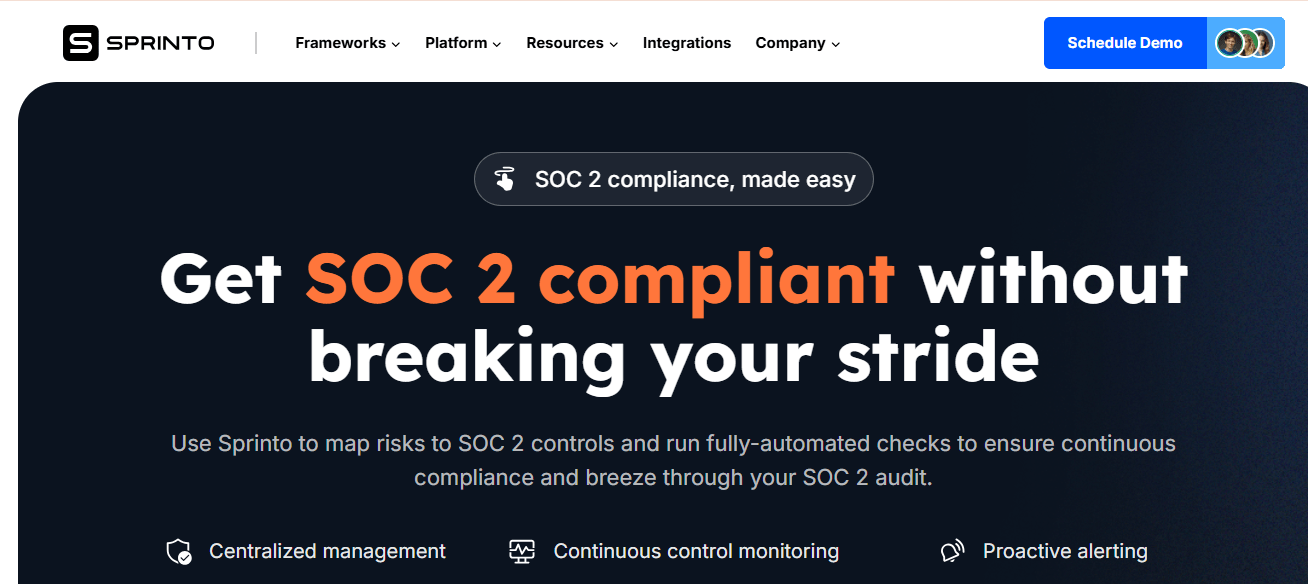
Sprinto is an end-to-end compliance automation platform that helps companies manage compliance tasks, reporting, and audit preparation efficiently. It tracks audit trails, calculates risk scores, and provides data analytics to keep you audit-ready in minimal time. You can customize automated reports for different compliance frameworks.
The software integrates with your existing tech stack, connecting to various applications and endpoint devices to monitor entity-level risks and controls. It gives you full visibility into your security and compliance posture and helps you create detailed risk and compliance reports.
Features
- Interactive health dashboard for real-time compliance status
- Automation tools to handle repetitive compliance reporting tasks
- Ready-to-use templates for generating compliance and trust reports
- Evidence logging and data analytics for audit readiness
- Built-in breach management and incident management modules
Pros
- Real-time risk scoring
- Customizable compliance workflows
- Automated evidence collection
- Automated policy distribution
- Suitable for all industries
- 24/7 proactive support
Cons
- Minor UI glitches
Pricing
Schedule Demo
10. LogicGate
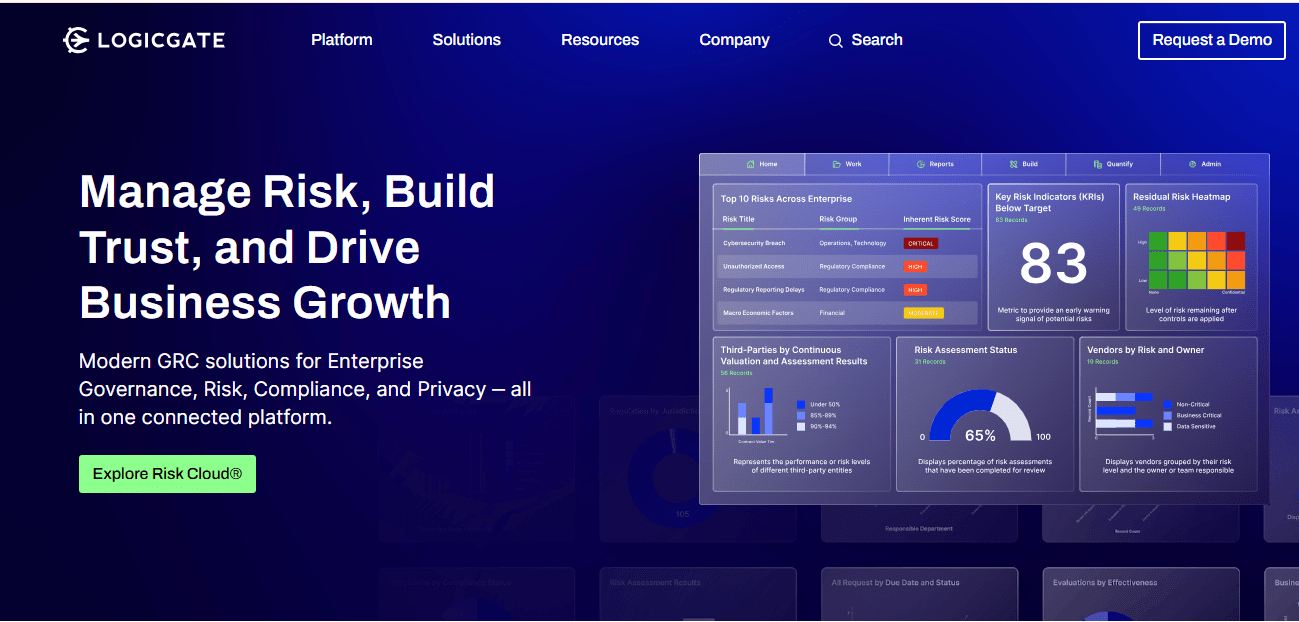
LogicGate is a leading SOC 2 compliance software that focuses on effective compliance and risk management. It adapts to a business’s unique needs and allows organizations to build customized workflows using its Risk Cloud platform.
The drag-and-drop interface lets companies design processes to meet compliance standards like SOC 2, GDPR, and HIPAA without starting from scratch. Its real-time monitoring system helps businesses detect and address risks early. The platform also provides detailed reporting, making it easy to create audit reports that keep stakeholders informed. By combining risk management and compliance in one platform, LogicGate makes a complex process easier to handle.
Features
- No-Code App Builder: Build and customize workflows without technical skills or external help
- Pre-Built Process Apps: Templates designed for governance, risk, and compliance
- Automated GRC Tasks: Automate repetitive compliance activities
- Risk Assessment and Management: Tools to identify, assess, and address risks
Pros
- Highly customizable with no-code tools
- Quick setup and faster time to use
Cons
- May be more feature-heavy than smaller organizations need
- Pricing based on applications and power user licenses can be complicated
Pricing: Request for demo
Choosing the right SOC compliance software plays a critical role in helping organizations achieve and maintain compliance efficiently. Your best option depends on your organization’s needs, size, budget, and compliance requirements.
Starting with a platform that provides solid automation, reliable support, and fair pricing builds a strong foundation for compliance success. As your program grows, you can move to more advanced platforms when necessary.

